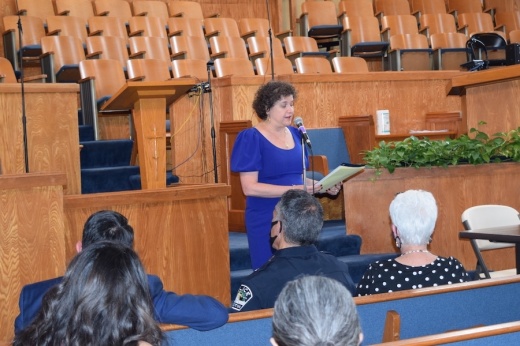The town hall highlighted current resources for addressing gun violence and testimony from survivors. Officials also provided loose insight into the tone and general plans discussed at the hours-long closed-door summit that preceded the public event.
“We spent the better part of this day working through what we know about this crisis, working through what we still have to learn, and working to ensure that we have a comprehensive strategy in our community to address gun violence,” District Attorney Jose Garza said.
In 2021, guns were the most common weapon used in homicides and suicides, according to the Travis County Medical Examiner’s annual report. Guns were used in 88 homicides. Sharp force objects were the next most commonly used item at eight. Guns were used in 106 suicides. Hangings were the next most common cause of suicide death at 67.
Travis County Judge Andy Brown said during the town hall that he is particularly concerned that 13 children were killed with guns in the county last year.
The working group of more than 65 individuals included city council members, county representatives, Austin ISD leaders, the Travis County Sheriff and the police chiefs from Austin, Pflugerville and Manor.
“We know that any strategy to reduce gun violence must begin with a commitment to hold accountable people who commit acts of gun violence, and you have my word that we do. And we'll continue to do that,” Garza said. “You have my word that if a person in our community picks up a gun, points it at another person and pulls the trigger, they will be arrested, and they will be held accountable.”
Later, Garza said his office has a higher than 90% success rate at prosecuting gun violence crimes.
District 10 Council Member Alison Alter said the summit and town hall had been planned prior to the Uvalde shooting where 19 children and two teachers were killed, but that mass shooting and others since cast a spotlight on the importance of the conversation.
“This is not the country that we need to live in. We're going to focus on things that we can do in the city of Austin. We do not have to live like this,” Alter said.
She said leaders discussed successful gun violence prevention methods other cities have implemented and the need for data to better understand what gun violence looks like in Austin.
“This strategy needs to be centered on our survivors and the communities that are impacted,” Alter said. “It needs to be based on data and evidence. It needs to be a combination of community violence intervention, as well as successful law enforcement activities.”
Alter said the Office of Violence Prevention would spearhead a comprehensive gun violence plan. Alter advocated for the creation of the office following the 2019 El Paso shooting.
The department was founded in 2020 and fully staffed in 2021. Alter said so far the office has worked on several initiatives such as on stress mitigation, youth outreach and safe gun storage.
In response to an audience question about keeping guns out of the hands of minors, Austin Police Chief Joseph Chacon said safe gun storage is a major issue in the area as most of the guns used in crimes have been stolen.
Austin ISD board president Geronimo Rodriguez also addressed gun violence in relation to children during his remarks, referencing a report that found shootings were the leading cause of death for children and teens in the United States in 2020. He said Austin ISD has used $22 million in voter-approved bond money and additional state funds to secure district facilities. Those improvements include bullet resistant film for windows and secured entry and exit points.
“School districts alone can't cure the gun violence problem and it's an unfair expectation,” Rodriguez said.
He said the district will continue to take safety measures, while also making decisions to address underlying causes of gun violence.
Three survivors of gun violence spoke about their experiences and what they would like to see in the community, including Cathy Collins, a victim’s advocate with the Christi Center, a local nonprofit that works with victims of crimes.
Collins, who lost a boyfriend and several family members to gun violence, advocated for more mental health services in the community.
Clarence Watson, who survived a driveby shooting, said he is working with the Crime Survivors for Safety and Justice to open a trauma center in Austin. He and others spoke about the need to support victims and to stop the cycle of victims later becoming perpetrators of violence.
The officials did not speak about gun control. The press release stated,”We will not have in-depth discussions on the policies of assault weapons bans and background checks at the meeting,” but added that community organizations could direct individuals toward ways to get involved in those conversations.
“Together, we can and will end gun violence,” Alter said.
Listen to hear editor Darcy Sprague offer more insights on the local gun violence summit on the June 10 episode of The Austin Breakdown.





